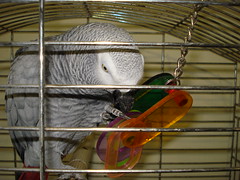
Generally, when birds fall ill, they show very few signs of being sick. Of all pets, bird's are probably the least domesticated, and act almost exactly the way they do in the wild. Hiding illness serves them well, as predators don't know who to pick as the weakest member of the flock. What does this have to do with feather plucking? Well, we can rule out a major illness. If your bird is plucking out it's own feathers, there's little reason to suspect that it may be sick. That's good news!
When your bird is plucking it's feathers, it's a sign that the bird is bored. Parrots are very intelligent and need to have large amounts of socialization and mental stimulation. They get this in the wild by being a part of a flock, and searching for food. In your home, in a cage, it's like being in solitary confinement for your bird. We use this same method as punishment for our criminals, we should understand the effect is similar on a bird.
A cage is necessary for your parrot's safety around your home, so we must do our best to make it's cage a place of relaxation and fun. The first way to do this is lots of toys. I prefer tough indestructible toys that present the bird with a problem, like how to get the treats out. This exercises their mind and gives them a creative outlet.
 |
 by ♡Blackangelツ by ♡Blackangelツ |
Every parrot owner also needs to allow their bird some time outside of their cage. Even if you own a parrot that cannot be handled, you should allow it some time out of its cage. They need to explore their surroundings and be in a new environment on a regular basis. I highly recommend making sure your birds wings are clipped to prevent it from flying, house's are generally not good places for aerial acrobatics. This time out of it's cage will do wonders for your bird, it helps the bird to not view it's cage as a prison, but rather just another room of the house.
The third thing your feather plucking parrot needs is socialization. Most parrots live in large flocks in the wild, and they need to feel a part of a group to feel secure. If possible, the best thing you can do is directly interact with your bird. Play with it, talk to it, and hold it. When you're not directly interacting, the bird's cage should be in a high profile area of your home. They do best in a room where your family spends most of it's time. Even being in a cage, seeing the members of your house gives the bird something new to concentrate on all the time. It lets them know that their "flock" approves of them, and will be there for them.
If you own a bird that is plucking it's feathers, its best to improve it's daily mental workout. By providing toys and socializing your bird, you can make both you and your parrot happy!
No comments:
Post a Comment